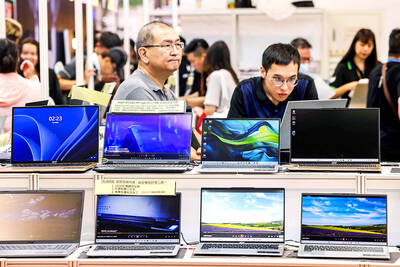HTC Corp (宏達電), the world’s largest maker of handsets running on Microsoft Corp’s system, unveiled two new handsets at the World Mobile Congress 2009 yesterday in Barcelona, Spain, featuring the company’s Touch Flo 3D touch-sensitive technology.
“HTC Touch Pro 2 and HTC Touch Diamond 2 will no doubt bring unprecedented user experience in the world of communication,” HTC chief executive officer Peter Chou (周永明) said in a statement yesterday.
The two smartphones both run on the Windows Mobile 6.1 platform and redefined mobile convergence by focusing on a “people-centric approach to mobile communication,” the company said.
HTC is counting on the launch of the phones to help secure a share in this emerging market. Researcher Gartner Inc said global sales of smartphones would continue to rise this year, although at a slower rate because of the global slowdown.
Aimed at business users and technology lovers, the new handsets also boast “Push Internet” technology that speeds up Web loading on pre-set bookmarks, HTC said.
Meanwhile, Nokia was to introduce an online application store as it tries to match the success of Apple Inc.
The Ovi store will start in May and offer applications ranging from games to location-based services, Nokia said yesterday in a presentation at the World Mobile Congress. The company also unveiled four new devices, two aimed at corporate users with e-mail functions and two with navigation.
Nokia has said its services and software unit should have at least 2 billion euros (US$2.55 billion) in sales by 2011. The business will focus on wireless Internet services for maps, music, games, messaging and media under the Ovi brand.
“The Ovi Store is a ‘smart store’ that will change the way our consumers discover and consume content on their mobile devices, ultimately making the experience easier, more fun and most importantly, more relevant,” said Tero Ojanpera executive vice president at Nokia Services.

TECH TITAN: Pandemic-era demand for semiconductors turbocharged the nation’s GDP per capita to surpass South Korea’s, but it still remains half that of Singapore Taiwan is set to surpass South Korea this year in terms of wealth for the first time in more than two decades, marking a shift in Asia’s economic ranks made possible by the ascent of Taiwan Semiconductor Manufacturing Co (TSMC, 台積電). According to the latest forecasts released on Thursday by the central bank, Taiwan’s GDP is expected to expand 4.55 percent this year, a further upward revision from the 4.45 percent estimate made by the statistics bureau last month. The growth trajectory puts Taiwan on track to exceed South Korea’s GDP per capita — a key measure of living standards — a

READY TO HELP: Should TSMC require assistance, the government would fully cooperate in helping to speed up the establishment of the Chiayi plant, an official said Taiwan Semiconductor Manufacturing Co (TSMC, 台積電) yesterday said its investment plans in Taiwan are “unchanged” amid speculation that the chipmaker might have suspended construction work on its second chip packaging plant in Chiayi County and plans to move equipment arranged for the plant to the US. The Chinese-language Economic Daily News reported earlier yesterday that TSMC had halted the construction of the chip packaging plant, which was scheduled to be completed next year and begin mass production in 2028. TSMC did not directly address whether construction of the plant had halted, but said its investment plans in Taiwan remain “unchanged.” The chipmaker started

MORTGAGE WORRIES: About 34% of respondents to a survey said they would approach multiple lenders to pay for a home, while 29.2% said they would ask family for help New housing projects in Taiwan’s six special municipalities, as well as Hsinchu city and county, are projected to total NT$710.65 billion (US$23.61 billion) in the upcoming fall sales season, a record 30 percent decrease from a year earlier, as tighter mortgage rules prompt developers to pull back, property listing platform 591.com (591新建案) said yesterday. The number of projects has also fallen to 312, a more than 20 percent decrease year-on-year, underscoring weakening sentiment and momentum amid lingering policy and financing headwinds. New Taipei City and Taoyuan bucked the downturn in project value, while Taipei, Hsinchu city and county, Taichung, Tainan and Kaohsiung

Micro-Star International Co (MSI, 微星科技) is expanding notebook computer production in India after partnering with Indian electronics maker Syrma SGS Technology Ltd late last year, as the Taiwanese company seeks to tap into the local market. MSI also plans to manufacture some of its new gaming PCs powered by Nvidia Corp’s RTX 50 graphics cards in India, while adding more advanced and design-focused PCs and notebooks at Syrma’s plant in Chennai, a source told the Taipei Times yesterday on condition of anonymity. MSI’s deployment in India is driven not only by cost advantages, but also by India’s rapidly expanding consumer market and